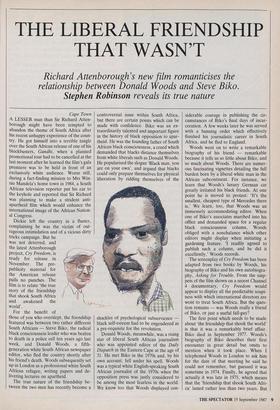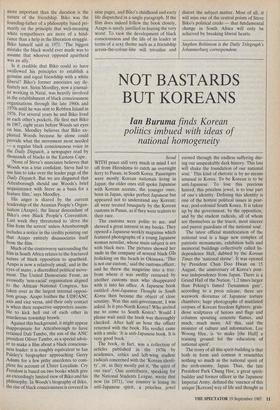THE LIBERAL FRIENDSHIP THAT WASN'T
Richard Attenborough's new film romanticises the relationship between Donald Woods and Steve Biko.
Stephen Robinson reveals its true nature Cape Town A LESSER man than Sir Richard Atten- borough might have been tempted to abandon the theme of South Africa after his recent unhappy experience of the coun- try. He got himself into a terrible tangle over the South African release of one of his blockbusters, Gandhi, when a planned promotional tour had to be cancelled at the last moment after he learned the film's gala premiere was to be held in front of an exclusively white audience. Worse still, during a fact-finding mission to Mrs Win- nie Mandela's home town in 1984, a South African television reporter put his ear to the keyhole and reported that Sir Richard was planning to make a strident anti- apartheid film which would enhance the international image of the African. Nation- al Congress.
story of the friendship ) that shook South Africa / and awakened the world'.
For the benefit of those of you who overslept, the friendship featured was between two rather different South Africans — Steve Biko, the radical black consciousness leader who was beaten to death in a police cell ten years ago last week, and Donald Woods, a fifth- generation white South African newspaper editor, who fled the country shortly after his friend's death. Woods subsequently set up in London as a professional white South African refugee, writing papers and de- livering lectures on apartheid.
The true nature of the friendship be- tween the two men has recently become a controversial issue within South Africa, but there are certain points which can be made with confidence. Biko was an ex- traordinarily talented and important figure in the history of black opposition to apar- theid. He was the founding father of South African black consciousness, a creed which demanded that blacks distance themselves from white liberals such as Donald Woods. He popularised the slogan 'Black man, you are on your own', and argued that blacks could only prepare themselves for physical liberation by ridding themselves of the shackles of psychological subservience — black self-esteem had to be engendered as a pre-requisite for the revolution.
Donald Woods, meanwhile, was a rising star of liberal South African journalism who was appointed editor of the Daily Dispatch in the Eastern Cape at the age of 31. He met Biko in the 1970s and, by his own account, fell under his spell. Woods was a typical white English-speaking South African journalist of the 1970s when the opposition press was justly considered to be among the most fearless in the world. We know too that Woods displayed con- siderable courage in publishing the cir- cumstances of Biko's final days of incar- ceration. A few weeks later he was served with a banning order which effectively finished his journalistic career in South Africa, and he fled to England.
Woods went on to write a remarkable biography of his friend — remarkable because it tells us so little about Biko, and so much about Woods. There are numer- ous fascinating vignettes detailing the full burden born by a liberal white man in the African subcontinent. For instance, we learn that Woods's luxury German car greatly irritated his black friends. At one point he is moved to protest: 'It's the smallest, cheapest type of Mercedes there is.' We learn, too, that Woods was an immensely accommodating editor. When one of Biko's associates marched into his office and demanded space for a regular black consciousness column, Woods obliged with a nonchalance which other editors might display when initiating a gardening feature. 'I readily agreed to publish such a column, and he did it excellently,' Woods records.
The screenplay of Cry Freedom has been adapted from two books by Woods, his biography of Biko and his own autobiogra- phy, Asking for Trouble. From the snip- pets of the film shown on a recent Channel 4 documentary, Cry Freedom would appear to display all the predictable soupi- ness with which international directors are wont to treat South Africa. But the ques- tion remains — was Woods really a friend of Biko, or just a useful fall-guy?
The first point which needs to be made about 'the friendship that shook the world' is that it was a remarkably brief affair. Biko died in September 1977. Woods's biography of Biko describes their first encounter in great detail but omits to mention when it took place. When I telephoned Woods in London to ask him for the date of that meeting he said he could not remember, but guessed it was sometime in 1974. Finally, he agreed that actually it was late in 1975, which means that the 'friendship that shook South Afri- ca' lasted rather less than two years. But more important than the duration is the nature of the friendship. Biko was the founding-father of a philosophy based pri- marily on the principle that well-meaning white sympathisers are more of a hind- rance than a help in the liberation struggle. Biko himself said in 1971: 'The biggest mistake the black world ever made was to assume that whoever opposed apartheid was an ally.'
Is it credible that Biko could so have swallowed his principles to establish a genuine and equal friendship with a white liberal? Biko's former associates say de- finitely not. Strini Moodley, now a journal- ist working in Natal, was heavily involved in the establishment of black consciousness organisations through the late 1960s and 1970s until he was sent to Robben Island in 1976. For several years he and Biko lived in each other's pocketS. He first met Biko in 1967, eight years before Woods set eyes on him. Moodley believes that Biko ex- ploited Woods because he alone could provide what the movement most needed — a regular black consciousness voice in the Daily Dispatch, a newspaper read by thousands of blacks in the Eastern Cape.
`None of Steve's associates believes that Woods was a true confidant. Steve had to use him to take over the leader page of the Daily Dispatch. But we are disgusted that Attenborough should use Woods's brief acquaintance with Steve as a basis for a feature film,' says Moodley.
His anger is shared by the current leadership of the Azanian People's Organ- isation (Azapo), the linear descendant of Biko's own Black People's Convention. Last week they threatened to 'drive the film from the screen' unless Attenborough includes a notice in the credits pointing out that Azapo entirely disassociates itself from the film.
Much of the controversy surrounding the film in South Africa relates to the fractured nature of black opposition to apartheid. Azapo is now a relatively small, and in the eyes of many, a discredited political move- ment. The United Democratic Front, an avowedly 'non-racial' organisation aligned to the African National Congress, has taken over as the largest internal opposi- tion group. Azapo loathes the UDF/ANC axis and vice versa, and their only contact is when their respective supporters assem- ble to kick hell out of each other in murderous township brawls.
Against this background, it Might appear inappropriate for Attenborough to have retained Dali Tambo, the son of the ANC president Oliver Tambo, as a special advis- er to make a film about a black conscious- ness leader: it is roughly equivalent to Ian Paisley's biographer approaching Gerry Adams for a few pithy anecdotes to com- plete his account of Ulster Loyalism. Cry Freedom is based on two books which give an exceedingly limited view of Biko and his philosophy. In Woods's biography of Biko, the rise of black consciousness is covered in nine pages, and Biko's childhood and early life dispatched in a single paragraph. If the film does indeed follow the book closely, Azapo is surely justified in fearing the very worst. To view the development of black consciousness and the life of its leader in terms of a sexy theme such as a friendship across-the-colour-line will trivialise and distort the subject matter. Most of all, it will miss one of the central points of Steve Biko's political credo — that fundamental change in South Africa will only be achieved by breaking liberal hearts.
Stephen Robinson is the Daily Telegraph's Johannesburg correspondent.



































































 Previous page
Previous page